Working in real estate, you’ve got to be prepared for a fast-paced work environment and able to think on your feet.
Making deals happen takes a lot of groundwork. Meeting clients, checking in with the office, maintaining community associations, booking open-house viewings, the list goes on.
So, what if there was software that could help take some of the pressure off?
Imagine software that could automate processes and help improve communication with your colleagues.
That’s exactly what property management software can do for you.
If you’re not using property management software yet, then you should be. This guide will take you through the benefits of using a property management platform and also give you an idea of which software would work best for you.
We’ll cover:
Download your free real estate prospecting playbook, featuring 9 prospecting letter/message templates! 🚀
What is property management software?
Property management software are basically applications and digital tools that are designed to assist real estate agents and property management companies with their workload.
A lot of responsibilities come with being a property manager, ranging from managing accounts, to processing documents, to dealing with online applications, and much more.
Property management software can help streamline these operations and automate processes. Some can even bring a wide range of tasks like accounting, property inspections, maintenance, and financial reporting together in one easily accessible online portal.
Benefits of using property management software
1. Improved communication
Communication is crucial in every work environment, but particularly when it comes to real estate. With colleagues coming and going out of the office to meet with clients and host viewings, it can be difficult for team building. This is particularly true when team members are working remotely, as is often the case nowadays. Property management software changes this.
With everyone working from the same (virtual) place, no matter where they are in the world, they’re able to access the same real-time information. The best property management software will also include messaging and file sharing, taking communication to the next level.
Using other online tools for real estate professionals will also help with this. Take RingCentral, for instance. Its phone calling software means that agents can always be in contact with the main office, even when they’re on the road:
Remote work at its most efficient.
2. Increased productivity for property managers
Staying on top of everything, including accounting, work orders, and maintenance management, can be challenging. In most cases, you may need to perform a background check on applicants, which may sometimes include a financial report.
By using property management software solutions, property managers can benefit from the automation of these processes, which means information gets gathered quickly and effectively. This frees up time for the rest of the team, who can concentrate on other areas, be more productive, and organize their workflows better.
💡 Pro-tip:
See how award-winning real estate firm Wagner Realty saved an incredible 58% on its telecom costs by making just one change.
With the right tools, managers can optimize staffing by looking at the number of calls being made, when clients and prospects tend to call most frequently, and how long they last. This can be a real game-changer for many real estate professionals who, without this kind of reporting, can miss important information. It also ensures they’re making the most of their time throughout the day.
3. Better security for online payments
One way to add security to your business operations is to start using a property management system. Nearly every business handles security sensitive data, so make sure your information (and your clients’ information) is protected is to use cloud-based property management tools that have built-in security.
This is a must-have, especially if you collect rent and keep bank account details on file—even for short-term arrangements.
4. Real-time information
Using property management software gives you access to real-time information and enables you to stay up to date at all times. Unlike spreadsheets and documents piled up on a desk, this information should be easily accessible from different devices by different people on your team.
One of the biggest perks of using cloud-based software is that it’ll update data automatically online, and sync it across different devices (and even apps, if you’re using app integrations). This lets you work from literally anywhere in the world. Combined with audio and video conferencing software, you don’t ever have to be tied down to your desk again.
Property managers can just use these real-time video conferencing capabilities to better manage property issues, identify problems quickly right away, and dispatch the right team to solve problems using video (which tends to be more reliable than information relayed through a text or email). Using a reliable and simple all-in-one communication platform like RingCentral, they can send messages to the team, have video meetings, and make phone calls—all from the same app:
5. Reduces admin work
Typically, property management can be time-consuming work, what with processing rental applications, tenant screening, and more. Information processed in this way can also be prone to errors and results can take time. Manually analyzing data can be the most laborious part of it.
User-friendly property management software automatically updates data. Real estate agents can compile comprehensive reports at the touch of a button, completely cutting down the time it takes to complete admin work.
How do I choose property management software?
When choosing the best property management software, you need to consider what your team could benefit from. There is plenty of great software for real estate agents out there, but this is your chance to personalize it to your needs. Think about your team size, whether you work from the office or remotely, and how many clients you have.
Here’s a rundown of what you need to examine:
- Your business’s needs: Before you invest in software, you need to analyze your business’s needs. Ask yourself why you need property management software or why you’re choosing to update your existing software. This should give you an idea of your pain points, and therefore, what needs improving.
- Systems and features: Not all property management softwares were created equally. Some have far more features than others (but with a price tag to match). Is communication important to you? Then software with communication portals for owners, residents, or board members might be best.
- Is there a trial?: The best way to find out whether property management software is right for you is to take advantage of a free trial. And, if they don’t offer a free trial, is it cost-effective and easy enough to try it for a few months and see whether you want to stick with it?
- Integration capabilities: Can it be integrated with some of your existing applications? It may be easier for you to use software that can already be used alongside platforms you’re familiar with. Platforms like RingCentral have many integrated applications, so you don’t have to copy and paste information all the time, since those apps will sync data between themselves automatically.
For example, Wagner Realty switched to a new phone system and communication platform, and the team was dreading having to move all their documents in G Suite over. Good news was their communication platform integrates with Gmail, which made it easy to bring that data over with just a few clicks. - Customer support: There are going to be times when the system doesn’t do what you want it to do and you need to contact customer support. Does this software have a good reputation for customer support? Check out reviews and see for yourself whether you think it offers the right level of support.
5 best property management software for real estate professionals
1. MRI Software
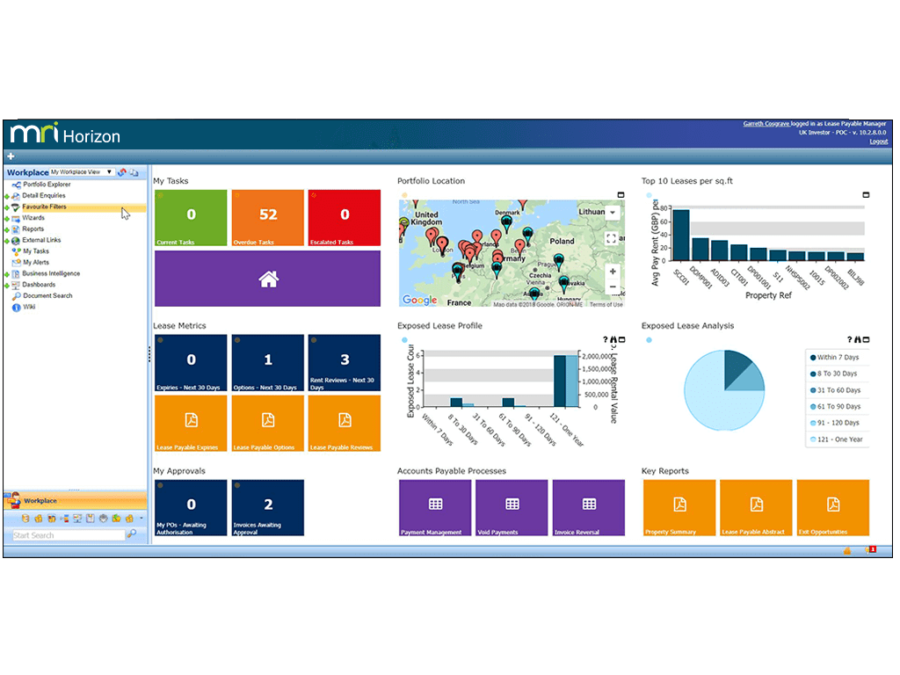
MRI Software offers cloud-based software and an app for mobile devices. Its sophisticated property management solution is used by over 10,000 real estate professionals across the globe.
What’s great about this software is that it can be used for commercial property, residential, and student housing properties, ideal if your real estate business includes all of these.
It says its goal is to increase property occupancy while at the same time reducing costs. That’s music to a property manager’s ears. But what other key features does MRI Software offer? Here’s a list of the top features to look out for.
Key features:
- Online payments
- Insurance management
- Expense management
- Maintenance tracking
- A landlord and tenant database
- Integrated accounting
- Electronic signature solution
- Rent and vacancy tracking
- Late fee calculator
Pricing: It offers a wide-range of options, so doesn’t offer general pricing information. You can request a free demo and inquire for more information on their website.
2. Buildium
Buildium offers a unique perspective on property management software, because the company first started out by managing properties. They now specialize in residential properties, rental property, affordable housing, and student housing.
It gives you a quick and easy way to manage your property portfolio, with an easy-to-use interface and system. You can use this software for several tasks, including managing finances, overseeing maintenance requests, and helping to screen tenants.
Key features:
- Online rent collection
- Integrated accounting
- Property inspection tools
- Tenant screening
- Communication portals for owners, residents, board members
- Leasing tools, e.g, auto-fill templates, e-signature
- Renters insurance
- Marketing tools
Pricing: Buildium starts at $50 a month, but each additional feature may cost more. If you require more than 100 units, you can customize your plan.
3. Appfolio
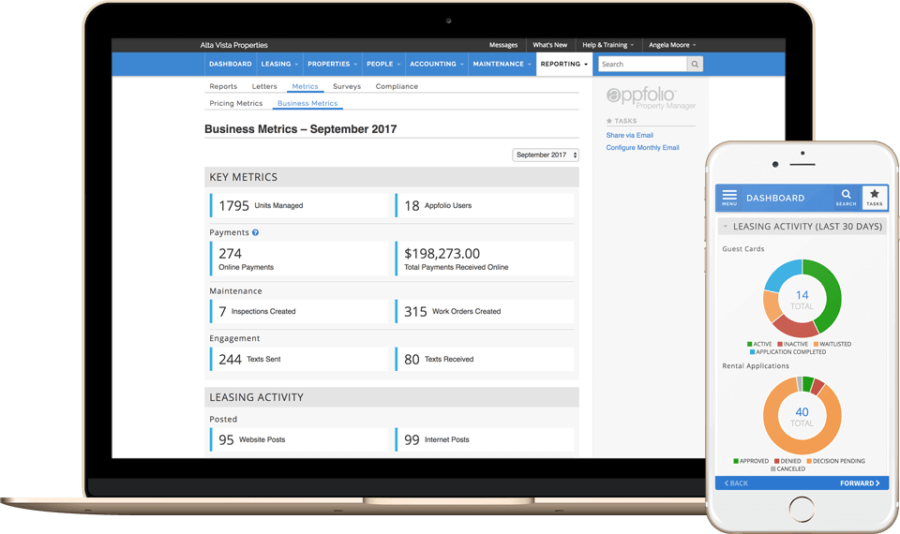
Appfolio property manager software is cloud-based and also features an app that can be used on any smart device. It has diverse features and is popular among property managers for managing assets and financial data.
The platform was designed to streamline processes, making for a more effective and efficient workflow. You can manage a range of property types through this software, including multifamily and single-family properties.
Key features:
- Rent payment collection tools
- Maintenance requests/tracking
- Accounting software
- Marketing tools
- Customizable online leases
- Owner portal
- Property inspection tools
- Tenant screening
- Utility billing
Pricing: A $400 onboarding fee. Then, various monthly plans are available depending on the type of properties you deal with, with a minimum monthly fee of $250.
Property managers with at least 50 units may find this to be more cost-effective, as the per-unit price ranges from $0.80 to $1.50. However, it can be more expensive for those with fewer units.
4. Yardi Breeze
Yardi Breeze describes itself as “refreshingly simple software.” It’s a cloud-based platform, but doesn’t offer an app like many others. It’s useful for various property types including residential, commercial real estate, rental property, self-storage, housing association, and affordable housing.
Its unique features make it a favorite with property managers. It has a simple system and easy-to-use interface, along with a customer service team that’s on hand to help with any issues.
Key features:
- Online rent collection
- Rental application screenings
- Integrated accounting
- Investment management
- Maintenance requests with option to attach photos
- Renters insurance
- Tennant communication portal
- Activity calendars
- Marketing tools
Pricing: It starts at $1 per month, per unit, with no setup fees. Minimum monthly spend is $100 for residential properties and $200 for commercial and mixed properties. Upgrade to Breeze Premier, which has a range of additional features at $2 per unit, per month.
5. Tenant Cloud
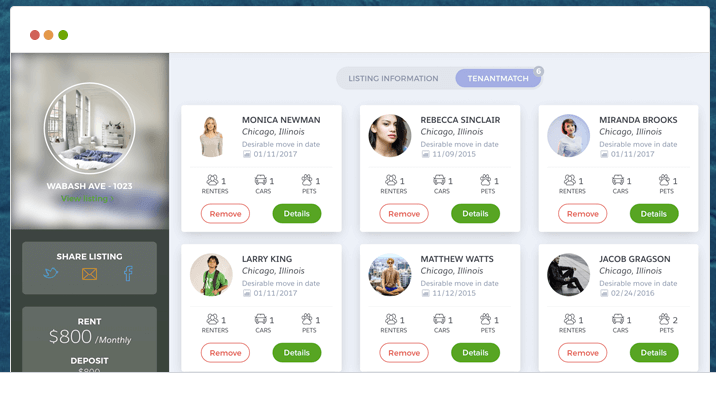
Tenant Cloud is a very mobile-friendly platform that was created with the aim to help landlords manage their property portfolio. It’s a cloud-based service with a mobile app, so it can be accessed from anywhere—ideal for landlords with a growing property portfolio but no office base.
Property managers also use this software, namely because it’s one of the most cost-effective on the market. If you have fewer than 500 units, then Tenant Cloud may be the best option.
Key features:
- Online payments
- Integrated accounting
- Maintenance requests
- Marketing tools
- Automatic invoicing
- Residential lease templates
- Tenant screening
- Insurance reminders
- Property analysis reports
Pricing: Tenant Cloud is one of the only property management software companies to offer a free tier up to 75 units. Ideal if you just want to test out the software before you commit, or if you have only a small number of units.
Their standard tier is $9 a month for 150 units, and their premium tier is $35 for up to 500 units and additional features.
Other essential tools for real estate professionals
RingCentral Office®
Property management software is great for communicating with landlords, tenants, and property owners through portals. But, what about real-time communication? That’s where RingCentral Office comes in.
Designed for modern virtual real estate offices, the RingCentral app completely simplifies communication by allowing you to send messages, make phone calls, and video calls no matter where you are—all in one app.
That means you can keep in touch with your colleagues, even when you’re out of office. Need to step away from your desk while on a call? Just flip your call from your computer to your phone (or vice versa):
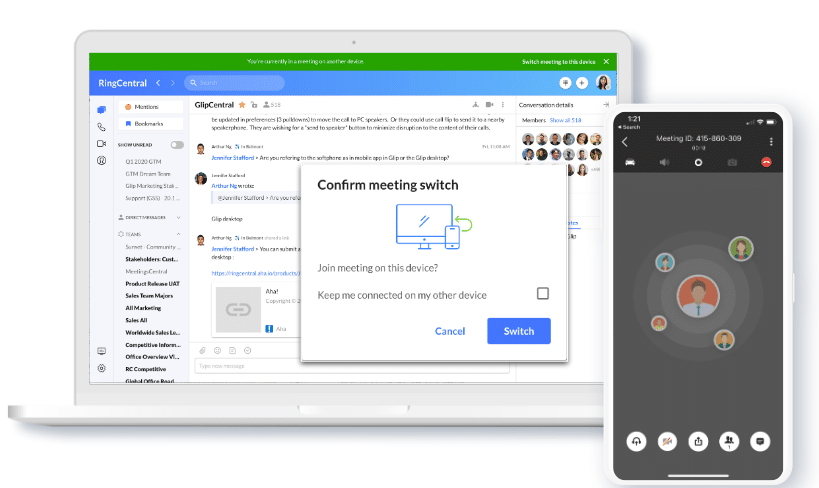
Plus it comes with everything you’d need, like:
- Call forwarding,
- Business caller ID—so that your personal number is shielded even if you’re taking work calls on your personal phone
- Unique voicemail features – There’s visual voicemail, which lets you read the message instead of listening to it—perfect if you’re in a meeting but want to read your voicemail
You can also integrate RingCentral Office with your DocuSign and Gmail accounts. Send contracts, meeting invites, and schedule calls with agents through this all-in-one hub.
And because RingCentral is available on both desktop and mobile app, it’s the perfect productivity tool for real estate professionals who want to be able to connect with their clients and team, no matter where they are.
RingCentral isn’t just useful for team communication either—it’s also perfect for connecting with clients. You can make and receive calls through its cloud phone system using your office phone number, so your personal number isn’t ever revealed, even when you’re calling from your own phone.
Need to walk a client through a virtual home tour, without having to physically be with them? The RingCentral app lets you do that too. If they like what they see, they can then request an in-person viewing. This means that their time isn’t wasted, and crucially—neither is yours.
You can check out the pricing and plans here, or… don’t commit yet and get a hands-on look at how RingCentral works by booking a product tour:
💰 You can also use this calculator to see roughly how much your business could save by using RingCentral to support your team’s communication with each other, clients, freelancers, and more.
Zillow Premier Agent
Zillow Premier Agent takes the guesswork out of real estate marketing. This clever platform allows you to connect with active buyers as soon as they search for a property on Zillow, and gives you useful insights into exactly what they’re searching for. Then, you can tailor your property recommendations to their needs.
This can save a lot of time when it comes to house viewings because your suggestions will be personalized to them. It can also minimize the time between your first contact with the client, and them purchasing a property.
DocuSign
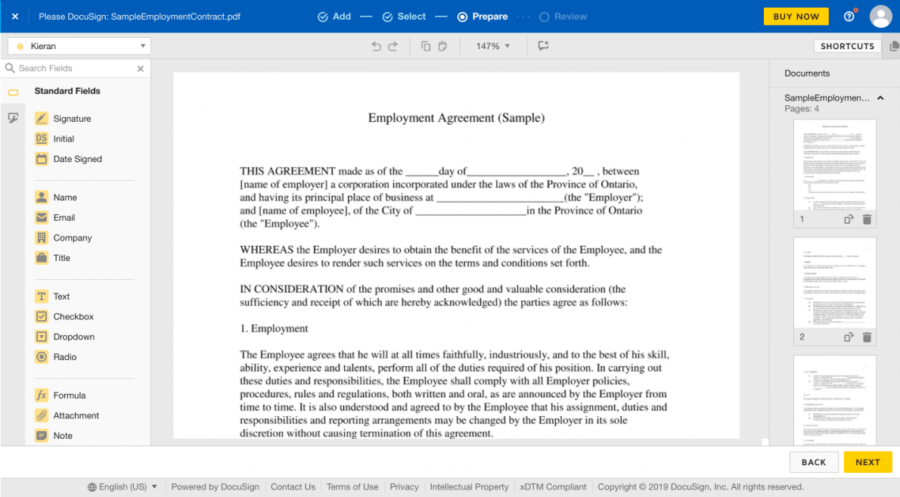
Not every property management tool comes with integrated e-signature capabilities. That’s when you need DocuSign. Used by many in the property industry, DocuSign allows you to securely and efficiently send documents like contracts and tenancy agreements over email, ready for signing.
The recipient will be able to easily sign the document and send it back. The amount of time saved by taking this process online is remarkable. Long gone are the days of printing countless sheets of paper and sending a hefty contract in the post. This alternative is eco-friendly and fast.
Mailchimp
Mailchimp is a must-have management tool. If you’re new to email marketing and you’re not fully confident in producing and sending marketing emails, Mailchimp is your helping hand. You can create campaigns, save templates, and sort mailing list data into key groups. It’s super simple to use.
One of the main benefits is that you can see the open rate of your emails, so you can track the properties that potential buyers are seeing from the email campaign.
It’s free for up to 2,000 contacts, useful if you’re just starting out or you want to get a feel for how Mailchimp works before committing.
It can also easily be integrated with RingCentral. This can offer you better team collaboration, and reduce email and app overload. It’s easier when everything is in one, convenient place.
What property management software will you be choosing?
Choosing the right property management software will inevitably help your workflow. Whether you’re new to property management software or you’re looking to upgrade the system you’re using, remember to compare the key features of what they offer and trial them, if you can.
And, don’t forget about the other useful tools you may need to improve your organization and capabilities. Using property management software in conjunction with great tools like RingCentral will enable you to work more productively and efficiently. Because, as a real estate professional, time is always of the essence!
Originally published Dec 15, 2020, updated Jan 30, 2023
